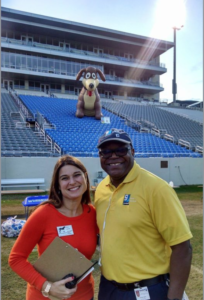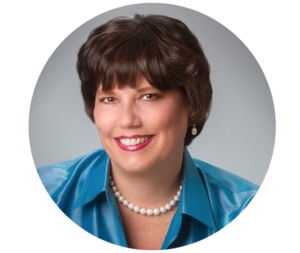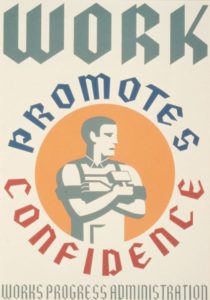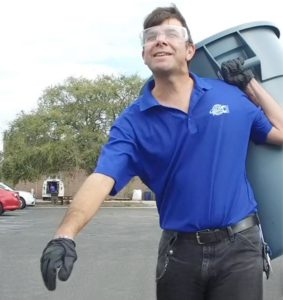Helping the Disabled to work Source America (S1E5)
In this episode, we go all the way back to the New Deal from President Franklin D. Roosevelt and we meet the folks at Source America. Listen to their inspirational stories about how they were trained, found work and improved their lives in a program still going strong.
Transcription of A solution over 75 years in the making, putting the Disabled to work (S1E5)
David: This is the good government show.
Jill Johnson: There’s a 70% unemployment rate for people of working age for people with disabilities. That’s kind of an important statistic if you compare that to the non-disabled population. There’s a lot of work to be done here.
David: Wow, that is an incredible statistic. And that is the topic of the good government show. Welcome. I’m Dave Martin.
Carol: And I’m Carol D’auria.
David: So this problem isn’t new. These folks have like a 70% unemployment rate.
Carol: Isn’t that incredible? It was President Roosevelt who recognized the problem. He signed the Wagner O’day Act and that established the federal government program that paid disabled people to make products for the military. And it eventually became known as the Ability One Program. And it’s still cold that today, and it’s really doing a great job.
David: So when you told me about the story, I did a little bit of research here because I like to research and I like to read about, you know, presidential declarations from years gone by. So this program was a federal government program, and it was originally part of Franklin Delano Roosevelt’s New Deal program, the New Deal program that you know, got us out of the depression. So since FDR time Congress has actually updated this law and it’s still enforced today. So this is a good government plan from 1938 that’s still effective.
Carol: Isn’t that amazing? And here’s how it works a nonprofit agency called Source America. It’s one of the two agencies that manages the Ability One program. And in essence, it just finds jobs for the disabled. So, for instance, you have Goodwill Services that is part of the Source American network, and it hires lots of disabled people to do federal jobs.
David: Well, you know, if a person is disabled, you know what kind of government jobs are they getting? You know, what are they doing?
Carol: Well, it actually, it runs the gamut. There are so many different jobs. I spoke to Jill Johnson. She is the vice president of products for Source America.
Jill Johnson: It can be anything from something as simple as very specific, wiping cloth used on maybe submarines to 100% of the chemical biological protection suits that every military personnel would wear in combat zone. So we can go from very simple to extremely complex. Additional products just to give you some idea include utility uniforms for military services. So if you see military personnel, it’s likely that some portion of what they’re wearing has been manufactured by our program.
We’re currently manufacturing the New Army Green Service uniform, which is the dress uniform for the army. That’s the retro World War two uniform. We also packaged and processed food. An example would be super cereal for USDA, and that is used for export feeding programs for nutritional supplements for children in third World countries. There are several agencies that manufacture hardware.
It could be glow plugs to side doors for Humvees to airplane parts. So there’s quite a variety of products. I think the one line of business that I probably didn’t mention was medical. And that is for state kids of all kinds. Again, if you see anybody in a combat zone wearing a first aid kit, it’s particularly army and Air Force. It’s likely to have come from our program.
David: So are these basically, you know, minimum wage workers? I mean, how do they get paid?
Carol: Right, the average pay is about $14.40 an hour. But there are lots of opportunities to move up the ladder. I spoke to a wonderful man named Anthony Green. Tony, that’s what he likes to be called. He’s originally from Philadelphia, and he now works for Goodwill Services in South Carolina. He actually spent eight years in the Navy. But when he was discharged well, he started to go off the rails. He was having trouble. That’s when his disability emerged, and he really wasn’t making good choices, but he managed to turn his life around. And here’s his story.
Anthony “Tony” Green: So once Goodwill hired me, I started a food service worker. I work really hard. I learned all the stations there. It was great working around people with disabilities. I didn’t have to hide anything that was the super part about it. It made my day a lot easier. You know, some less than me, some more so than me. Disabilities and struggle with those. So I learned all the stations and I got promoted to cook. And so that was great, so now I’m really, really hyped. I know. You know, I can go further. And then after that, I was the line supervisor with at the line supervisor. So now I’m kind of supervising the people that are trained me. So it was it was a challenge.
And after that, for about about a year, then I got promoted to assistant project manager at one of our largest custodial site in Charleston. So that was a reckoning. It was great. The money was really good. So I was really happy about that. And then two years later, I was promoted to a project manager, so I had my own projects. So I had GSA and then NOAA weather station. Actually, disability, it never got in the way it was how I felt about myself.
It was just my self-esteem that was really crushed. You know, it wasn’t a hurdles or the individuals around me. Good will put me in a place to succeed. They did they say these are all the things we do. You make your choice, you do too hard, you’ll make those and those dreams will come true and has, you know, and it’s funny when I was at the VA, you know, used to watch this lady come out and smoke and I was like, Man, that’s a real nice lady, man.
I got to get my stuff together. You know, now we’re married and I just bought my first house where credit’s excellent. It, it took some hard work, you know, and Goodwill gave me all the tools I needed and they were patient. Mr. Reggie, will, you know, if I had a question, I can always call him. I needed somebody to mentor me.
Carol: It’s wonderful to hear. So how long have you been with goodwill now?
Anthony “Tony” Green: Just celebrated nine years last Friday?
Carol: That’s great. Great to hear.
Anthony “Tony” Green: So I was able to accomplish all that with hard work in nine years and me. So, you know, when I got to tell my story, that’s what it’s about. You can do it.
David: Wow, what an upbeat guy.
Carol: Yeah, he really is so positive and inspirational. In fact, in addition to his job with Goodwill Services, he does motivational speaking for Ability One another person who has a disability and is doing really well is Candace Hartley.
Candace Hartley: I suffer from the panic and anxiety disorder. And at the beginning there was like, I didn’t want to be around people. Sometimes I was scared to leave the house because I was afraid people were following me or watching me. And it took a lot of work and I decided that I wanted to get back into into the workforce. And through there, I was hired through the Ability One program I learned and I worked really hard to get where I’m at today to, you know, you have to take one day at a time and one step at a time, you know, and they’ve given me the tools and the confidence in myself to be able to do my job to the best of my ability and to help me to where I am today. And so now I just want to share that as being an advocate with people with disabilities so I can put my voice out there, that we are important, that we are somebody.
Carol: Exactly that is so great. Some people, their disabilities are very apparent, but other people you can’t see, you can’t.
Candace Hartley: You can’t see it.
Carol: And that creates a problem in itself, right?
Candace Hartley: Yes, it does. I mean, because I can remember, you know, at the very beginning when I was first diagnosed with that, you know, I’d have people tell me that it was all in my head. You know that there was something wrong with me. You know that I was lazy and all these things, but they couldn’t understand that it is a disability. It is very frightening to go through. And I still deal with it on a daily basis, I have learned to control it.
David: Does Candace Hartley, does she do motivational speaking as well?
Carol: Yeah. Candace has quite a story and she speaks to different groups just like Tony does. Listen to this.
Candace Hartley: I have told my story to Congress, and my story is very emotional for me because it talks about how I lost a 23 year marriage and three years later, I lost my brother and six months to the day, I lost my father. So it’s kind of emotional when I tell my story. So when I read it, I always cry. But it also tells them there how I overcame that by working with the Ability One program and Source America. And I just like to let people know that we’re still able to do our job to the best of our abilities. I have so much support from different organizations that I work with, but through Palmetto Goodwill and the Ability One program and Source America, you know, there are a great, great bunch of guys to work with, and they have given me so much support and so much confidence that I have been able to build up in myself.
David: The sponsor of the good government show is Liquid.
Carol: And we love Liquid, and not just because they are the sponsor.
David: Well, that’s why we love them, because they are the sponsor. But Liquid, what they are, is they’re a digital marketing and technology company. And what they do is they help other companies find their customers and they engage them digitally. One of their customers was a fifth generation business, and Liquid got involved and helped them tell their story and highlight their rich history on their new website that liquid created.
Carol: The family had trouble just talking about their products. Well Liquid showed them a clear way to get their message across?
David: And now they have a new award winning web site thanks to Liquid, where they have people that make websites and write websites and create websites.
Carol: That’s right, Liquid has a full creative staff. They find out where each customer’s clients live online, whether it’s Facebook or YouTube or LinkedIn, whatever it is. The bottom line is Liquid helps their customers with a full digital marketing campaign.
David: And that’s why we love Liquid and because they’re our sponsor. But we really do love Liquid. At Liquid, they make digital work, so check them out on the World Wide Web at Liquid INT dot com. That’s Liquid INT dot com.
The good government show is also sponsored by the Rodale Institute. Well, what is the Rodale Institute, you say? Well, the Rodale Institute is growing the organic movement through research, farmer training, and consumer education. They make healthy food there. What’s better than healthy food that tastes great. With eight locations across the country and online educational programs, Rodale Institute provides workshops, webinars and online courses like you could learn to be a beekeeper or you could learn how to grow epic tomatoes, and the classes are very affordable. Rodale does farm consulting and training programs, helping to move the business and products of our agricultural system to a more organic and regenerative future. Check them out at Rodale Institute dot org. That’s Rodale Institute dot org.
The Good Government Show is also sponsored by Kutztown University. With more than 130 areas of study, 200 student groups and 22 Division II sports teams, Kutztown University is the perfect place to find your passion, right in the Lehigh Valley of Pennsylvania. Here’s what I know about Kutztown, they have a great rugby team. They have a sports management program, among many other business programs. The school started as a teachers college and they still have an excellent education program. Arts programs and a German history program are just some of the many ways Kutztown University stands out. At Kutztown you can truly major in – Discovering Yourself. That’s Kutztown University.
Carol: There are lots of people who are doing really well, and they have all kinds of disabilities and the disabilities are quite varied. Jill Johnson, the executive with Source America, can talk about that.
Jill Johnson: Within the total network across the company on commercial and federal contracts, so the nonprofit agency supplying its probably around 85,000. Within the Ability One program specifically supporting federal contracts, it’s a little over 40%.
Carol: What kinds of disabilities are we talking about?
Jill Johnson: A broad range of disabilities? It could be physical disabilities. We have several thousand wounded warriors or veterans in our program. It could be disabilities from birth, you know, Down’s Syndrome, any kind of mental disability. It could be mental health issues. The qualification and there is a pretty robust qualification process within the program to ensure that a person’s disability meets the requirements is that they they really can’t be competitively employed outside of the program. So they’re within our program, their learning work skills, they’re learning how to come to work and how to socialize at work. It’s it’s a training ground for them and then they can make decisions just as we have choice, whether they want to advance their career outside in the commercial industry, if they’re comfortable where they are. We promote upward mobility, whether it’s within the organization they’re in or externally.
David: So these disabled workers, they have a really great place to start here. But what are they just walk in the door and apply for a job? Do they get training? Are these paying jobs? You know, are there jobs in the private sector for them? I mean, you know, how do they go about getting hired and how do they find these people?
Carol: All right. Well, first of all, there are commercial companies that hire the disabled, but many of them don’t. So we have places like Goodwill Industries that train people. They also do outreach to try to convince the private companies that hiring the disabled can actually be profitable. Reggie Hughes is the executive director of Palmetto Goodwill Services in North Charleston, which is South Carolina. And he says that’s what they stress when they do outreach to these companies. They stress that hiring the disabled can be quite beneficial.
Reggie Hughes: Just a matter of educating them about supports and accommodations and looking at the positive. And most of the accommodations that some of the folks require is very little. When you look at the trade off on productivity and the work ethic and the quality of employee that you’re going to get. So it just from my standpoint, it’s more of an education piece and giving them a look at, you know, what goes on behind the curtain. So we do a lot of site visits, we do a lot of outreach as far as giving briefings on our program, and we try to highlight our success stories through the Candace’s and the Tonys so we can break down those barriers or the stereotypes that people have about people with disabilities.
Carol: Could you give me an example of. An accommodation that a company might have to make for somebody.
Reggie Hughes: Well, we had one individual that we placed at a Panera Bread. And this person was deaf, so one of the accommodations was to match this person up with someone who had some basic sign language skills and just so happened that this particular organization, they had a couple of other deaf employees that had been employed there. And one of the managers wasn’t fluent, but was able to communicate with other individuals who are hearing impaired. So that was one example of an accommodation.
David: Well, these are people that probably had a lot of challenges finding jobs, but I’m sure they’re really excited to have a job now, and I’m sure they’re trying their hardest to be good workers.
Carol: Well, and you know what? They actually stand out in many different ways.
Jill Johnson: Unfortunately, I think employers are for-profit businesses. They’re concerned about the bottom line. They’re concerned about the worker being able to produce at the level they need them to produce, and they’re concerned about the different levels of accommodations they have to employ, but the person with disabilities. That viewpoint is failing to look at the ability side, and it is amazing when you give people with disabilities chances what they can do. The absentee rate is extremely low for people with disabilities. They value their work. They don’t want to be there every day.
We’ve had many stories during national or natural disasters where people show up in the middle of a hurricane to clean a building or to answer a call center. So these people really want to come to work. And so for maybe some of the support you give on one side, you benefit significantly on another side. So the rate of absenteeism on on our side is much lower than commercial competition because people really do value their employment. So I think that commercial companies probably underestimate the abilities of people with disabilities, and they tend to focus on the disabilities and not the abilities.
It’s also a benefit to the government. And to the taxpayer, because people with disabilities who have employment become taxpayers themselves and are not receiving the Social Security benefits that they would normally receive when they were not employed.
Carol: So David, if there’s a disabled person out there who is unsure about trying to get a job or maybe an employer who’s unsure about whether to hire a disabled person, I want to close with this message from Tony Green.
Anthony “Tony” Green: I would say, give us an opportunity, you know, give us an opportunity to showcase our skills. Like you say, most disability, some disabilities you can’t see, so you really don’t know. But there’s a job for everybody out there, even if it’s just opening and closing the door. You know what I mean, I be in a hotel is a job for us out there, you know, give us an opportunity to showcase our skills and be a productive member of society. I feel so good about that now, paying my taxes and doing the things that everybody do, everybody does on a normal day, you know, I enjoyed it. You know, I’m a man, you know what I mean, I’ve built myself up where I don’t feel ashamed of myself anymore. You know, Goodwill gave you that opportunity to feel good about myself.
Carol: And that’s a wrap. I’m Carol D’auria.
David: Wow, this is really a great story you’ve brought us this week, Carol. You know, folks that really have some challenges in getting hired, getting hired and working and stay employed. That’s a great story, and it’s a great example of a government program for a long time ago that’s still effective today.
Well, thanks for listening. I’m Dave Martin. This is the good government show. See you next time.
The Good Government Show is a Valley Park Production, Jason Stershic is our editor and producer. Associate producers are Jade Ludlow and Mackenzie Martin, the executive producers of The Good Government Show are Jim Ludlow, David Martin and David Snyder. Join us again right here for another episode of The Good Government Show.






